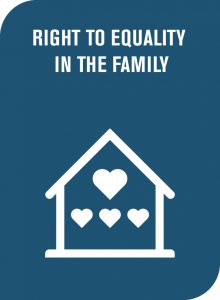
What it means
- African Charter on Human and Peoples Rights (Article 18.2-4): The State shall have the duty to assist the family which is the custodian of morals and traditional values recognized by the community. The State shall ensure the elimination of every discrimination against women and also ensure the protection of the rights of women and the child as stipulated in international declarations and conventions. The aged and the disabled shall also have the right to special measures of protection in keeping with their physical or moral needs.
- American Convention on Human Rights (Article 17.4): The States Parties shall take appropriate steps to ensure the equality of rights and the adequate balancing of responsibilities of the spouses as to marriage, during marriage, and in the event of its dissolution. In case of dissolution, provision shall be made for the necessary protection of any children solely on the basis of their own best interests.
- ASEAN Human Rights Declaration: The family as the natural and fundamental unit of society is entitled to protection by society and each ASEAN Member State. Men and women of full age have the right to marry on the basis of their free and full consent, to found a family and to dissolve a marriage, as prescribed by law.
- Arab Charter on Human Rights (Article 33.2): The State and society shall ensure the protection of the family, the strengthening of family ties, the protection of its members and the prohibition of all forms of violence or abuse in the relations among its members, and particularly against women and children. They shall also ensure the necessary protection and care for mothers, children, older persons and persons with special needs and shall provide adolescents and young persons with the best opportunities for physical and mental development.
How it relates to violence against women
It is important to remember that violence against women is not only about the act itself, it is also about power. The Universal Declaration of Human Rights tells us the family is the basic unit of society. Yet, one of the most dangerous places for a woman to be is in her own home. When inequality within the family goes unaddressed, it limits women’s decision-making and control of her future. In these situations, the likelihood of experiencing gender-based violence increases. And when acts of VAW go unaddressed or are even socially accepted, it can contribute to a dangerous culture of impunity for gender-based crimes that will perpetuate gender inequality. For example, 75% of men (aged 15-49) in the Central African Republic believed a husband was justified in beating his wife for certain reasons – including burning the food and refusing sexual relations – while 80% of women (aged 15-49) believed the husband was justified for the same reasons.
Inequality in the family may also be unjustly supported by law. Article 40 of Yemen’s Personal Status Act No. 20 (1992) states that: “A husband has the right to be obeyed by his wife in the interest of the family…” These types of laws violate a state’s human rights obligations and prevent women from accessing justice when gender-based violence occurs at the hands of their husbands.
Examples of violence against women that violate this right include:
- Economic abuse by a spouse or family member
- Marital rape
- Female infanticide
Click on the cases to the right (or, for mobile users, at the bottom of this page) to learn more about the right to equality in the family and violence against women.




